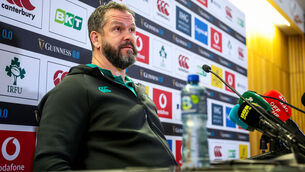Ireland hang onto improbable dream
The most fitting individual moment must be the reception afforded to Brian O’Driscoll on his arrival on the pitch on Saturday to mark his 100th Irish cap – heartfelt recognition and appreciation from both sets of supporters who, as one, got to their feet to acknowledge and applaud a genius of the game. Only John Pullin, leading out England at Lansdowne Road on that landmark occasion in 1973, has experienced a greater entry.
How fitting it was that this Irish team should produce a performance where all the captain’s best attributes were replicated by his colleagues – unwavering commitment, bravery in the tackle, clinical in attack and impregnable in defence.
















